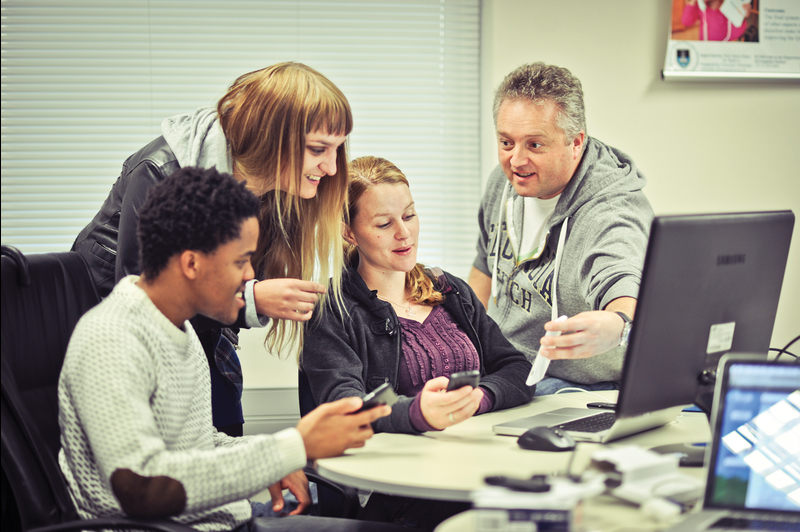How Gitau got to Google
03 June 2013
Revolutionary method finds jobs for skilled workers
A PhD student's ground-breaking technology solution has not only changed the lives of many skilled workers who couldn't find employment, but has also landed her a job with Google on African soil.
Shikoh Gitau, who hails from Kenya and graduates this week, devised a simple, yet revolutionary, approach to using mobile technology to connect skilled workers with prospective employers. It has met with such success that it is currently being rolled out nationally as a free service on a mobile network, and plans are also afoot for the programme to be rolled out across the rest of the developing world.
Gitau devised it in collaboration with staff in UCT's recently established Information and Communication Technologies for Development Centre (ICT4D). The relatively inexpensive application, which matches unemployed workers with employers desperate for their skills, has enormous implications for the labour force in regions where unemployment is high.
This innovative way of using mobile technology to meet societal needs on the continent serves as just one example of the work being undertaken by the ICT4D Centre, which was launched by the UCT Department of Computer Science in 2009. Its staff and students are dedicated to finding suitable mobile solutions that meet the societal needs of people living in Africa. They work closely with communities to create and evaluate technology that is best suited to local conditions.
The centre has already produced an impressive portfolio of mobile apps and other innovations that provide solutions to health, education and labour sector issues. It is supported by the Hasso Plattner Institute (HPI) in Germany which provides full bursaries for nine postgraduate students, many of whom are academics from elsewhere in Africa.
Engaging local people
"We share the philosophy that the best research outcomes occur if you engage local people to use ICTs to solve their own problems. Until now the question has been, how do you do that? The answer is to get academics from African countries to come to UCT to study ICT for development purposes, and then go back to their home countries and teach their own students," maintains the director of the centre, Professor Gary Marsden.
Marsden and his colleagues have seen many examples of how ICT developers, especially in the West, have built systems for developing countries but have failed to take local technology conditions into account. Examples of problems for roll-out include limited internet access, limited electricity supply, and many others. The ICT4D Centre recognises the fact that, globally, only one billion people are estimated to have access to the internet via PCs. By contrast, there are 5 billion people who own cell phones – and many of them live in the developing world.
In a break from the norm, the centre also draws on the expertise available from other UCT faculties, including Commerce, Science, and the Humanities.
These collaborations are blazing new trails as a result, and Gitau's ground-breaking project was the result of such an interdisciplinary collaboration. The Kenyan postgraduate student began her research with a six-month stint at a Khayelitsha-based NGO called 'Learn to Earn'. Among the NGO's projects is one in which women train over several months to become seamstresses.
Getting onto the Internet
Working with her Humanities supervisor – a visiting Microsoft researcher in Communication Studies at UCT – she conducted an ethnographic study of this group. "The fact was that people had phones that could get them onto the internet, but they weren't using it. So she spent six months on site with these ladies and trained them how to access the internet. Once she got them onto the internet she then asked them what they were most interested in, and what they would most like to find out," says Marsden.
Not surprisingly, their biggest concern was finding employment after completing their training course. Gitau then discovered that a host of clothing manufacturers were finding it difficult to appoint qualified staff. The reason was obvious: Most of these companies and NGOs were advertising posts on the internet; and, as is the case in most of Africa, many potential workers didn't have access to the Web.
Consequently, Gitau and Marsden created a system that converted these internet job advertisements so that cell phones could access this information.
However, there was an additional hurdle. Employers wanted candidates to submit CVs, which was not possible on the cell phones the workers were using. Gitau addressed this by writing software that, through a series of questions – such as 'What is your name'? – allowed candidates to create and submit their CVs via their cell phones, explains Marsden.
Designing the right system
"Gitau's study popped up on Google's radar and the company granted her a very prestigious scholarship. She even received a letter from the Speaker of Parliament congratulating her on her astonishing achievement – even though she's not South African!" exclaims Marsden.
Gitau has since been appointed to Google's User Experience Group in Africa, and her role is to explore the ICT needs of different groups throughout Africa and emerging markets, and design appropriate systems so that Google can meet those needs.
The story doesn't end there. The Praekelt Foundation, established by South African IT millionaire Gustav Praekelt, learned about the software and is in the process of up-scaling the system to make it available nationally, free of charge.
The system has now been rolled out in South Africa (http://www.ummeli.com), and it is hoped that it will be made available in other African countries before too long.
 This work is licensed under a Creative Commons Attribution-NoDerivatives 4.0 International License.
This work is licensed under a Creative Commons Attribution-NoDerivatives 4.0 International License.
Please view the republishing articles page for more information.








